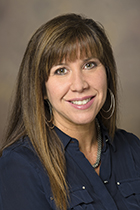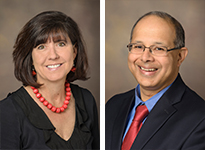 UA Department of Medicine Chair Monica Kraft, MD, announced last week that Amy Sussman, MD (right), associate professor of medicine in the Division of Nephrology, director, UA Nephrology Fellowship Program, and clerkship director for the Department of Medicine, has accepted a new leadership position within the department as Vice Chair for Education. She starts in this new role today, March 1.
UA Department of Medicine Chair Monica Kraft, MD, announced last week that Amy Sussman, MD (right), associate professor of medicine in the Division of Nephrology, director, UA Nephrology Fellowship Program, and clerkship director for the Department of Medicine, has accepted a new leadership position within the department as Vice Chair for Education. She starts in this new role today, March 1.
“Please congratulate Amy and offer her all your support as we continue to advance in our mission to teach and train the next generation of physicians to improve health care in Arizona, our nation and beyond through new therapeutic discoveries and new models of compassionate care,” said Dr. Kraft (below left).
 UA Division of Nephrology Chief Prabir Roy-Chaudhury, MD, PhD (on right at left), also expressed his delight at Dr. Sussman’s promotion to lead the department’s educational programs.
UA Division of Nephrology Chief Prabir Roy-Chaudhury, MD, PhD (on right at left), also expressed his delight at Dr. Sussman’s promotion to lead the department’s educational programs.
“Indeed I cannot think of a more passionate advocate for medical students, residents and fellows than Amy, and I know that she will do an amazing job,” he said. “It is also a matter of great pride for the Division of Nephrology that Amy will now be leading the Departments activities in this area. Congratulations, Amy.”
Dr. Sussman said she will work collaboratively with “our many talented” program directors, coordinators and other staff to further improve the department’s three ACGME-accredited residency physician training programs (two in internal medicine and one in dermatology), 15 ACGME-accredited fellowship programs, and clerkship and sub-internship programs in internal medicine for medical students at the UA College of Medicine – Tucson.
She’ll also push forward on recent Department of Medicine educational initiatives on a proposed merger of the UA Internal Medicine Residency Programs at Tucson and South Campus as well as to create a primary care track for those residents looking to garner broader training experience as primary care physicians. And she looks to raise the profile of the department’s undergraduate medical education efforts as well as its clerkship and sub-internship training program.
Dr. Sussman said, “My passion for medical education started with teaching our first-year med students their renal block. Later, I see those same students for third- and fourth-year clerkships. And I do advanced teaching with our nephrology fellows. Students, residents and fellows have a wonderful ability to inspire us, keep us on our toes, and remind us why we chose this profession in the first place! It’s critical we provide the best education possible for our trainees. After all, they’ll be the ones treating us later in life.”
She notes changes in medical and graduate medical education over the past several years make the task ahead for academic medicine more arduous.
“We are working to train physicians under the constraints of duty hours, reduction in patient volumes (per ACGME), and a shrinking time available for dedicated didactic or teaching time with faculty due to the real pressures of generating revenue. I am hopeful to be able to study how this has impacted physicians in terms of ‘who they become’ following their training,” Dr. Sussman said. She elaborated that this means work ethic, competency, quality of life, ability to navigate an increasingly complex health care system, and factoring in social and behavior dynamics that play into health and disease.
“How are we going to do this in a manner that’s grounded in educational theory? Whatever we choose to do moving forward, I’m determined we work together to ensure it’s based on evidence and best practices,” she added.
A native of Akron, Ohio, Dr. Sussman earned her medical degree at the UA College of Medicine – Tucson and completed her residency in internal medicine at the University of Washington School of Medicine in Seattle, where she also was chief resident. In addition at the University of Washington, she completed a clinical fellowship and a research fellowship in nephrology and was a senior research nephrology fellow. As such, she spent three years dedicated to bench research focusing on mechanisms of podocyte detachment utilizing both cell culture and animal models under the direction of Stuart Shankland, MD.
Recruited to the UA faculty in 2009, Dr. Sussman has served as a clinician educator with a strong emphasis in medical student teaching recognized by multiple UA College of Medicine teaching awards. She became director of the Nephrology Fellowship Program in 2013 and director of the Clerkship Program in 2015. In 2016, she was promoted to associate professor. Dr. Sussman maintains an active interest in Glomerulonephritis and is a sub-investigator of the Membranous Nephropathy Trial of Rituxan (MENTOR) clinical trial. She also serves as the medical director of DCI Desert Dialysis clinics in South Tucson and Sahuarita, Ariz. In addition, she has developed and is the clinical director of the nocturnal in-center dialysis program at DCI South Tucson.
Her undergraduate degree is from Arizona State University, where Dr. Sussman was also a research assistant in the Department of Psychology/Behavioral Neuroscience before coming to the UA as a medical student.
She replaces Kenneth S. Knox, MD, the department’s previous vice chair for education who left in December to become associate dean for faculty affairs and development at the UA College of Medicine – Phoenix. He had served as vice chair and chief of the Division of Pulmonary, Allergy, Critical Care and Sleep Medicine since October 2010.
ALSO SEE:
“Distinguished Physician-Scientist Dr. Kenneth S. Knox Named Faculty Affairs Associate Dean at the UA College of Medicine – Phoenix” | Posted Dec. 6, 2016
“DOM Faculty Repeat as Winners in the 37th Annual College Teaching Awards” | Posted Nov. 3, 2016
“Nine Faculty Physicians Receive Promotions in Department of Medicine” | Posted Aug. 19, 2016

